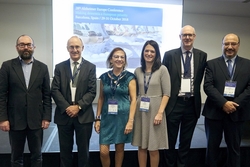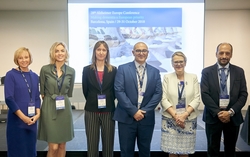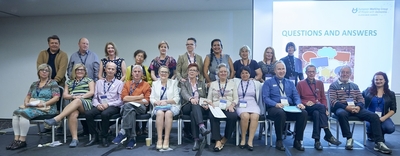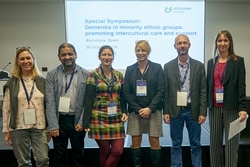Barcelona, 31 October 2018 – The second day of the 28th Alzheimer Europe Conference (#28AEC), on 30 October 2018, focused on dementia as a policy priority and the importance of a human rights-based approach to dementia and disability.
Dementia as a policy priority
 The first plenary session on “Dementia as a policy priority” was chaired by Jesus Rodrigo (Spain) and opened with the first of four “Meet the researchers of tomorrow” sessions. Anja Leist, Associate Professor at the University of Luxembourg, presented the World Young Leaders in Dementia (WYLD) network, which brings together young professionals in the field of dementia, supporting the work of the World Dementia Council. The WYLD consists of over 250 members from 30 countries around the world and ages range from 22-40. Its priorities are to facilitate professional careers in dementia by offering training and mentoring, to facilitate the uptake of new technologies to improve quality of life of persons with dementia and their families and to increase awareness and fight stigma around dementia. The first plenary session on “Dementia as a policy priority” was chaired by Jesus Rodrigo (Spain) and opened with the first of four “Meet the researchers of tomorrow” sessions. Anja Leist, Associate Professor at the University of Luxembourg, presented the World Young Leaders in Dementia (WYLD) network, which brings together young professionals in the field of dementia, supporting the work of the World Dementia Council. The WYLD consists of over 250 members from 30 countries around the world and ages range from 22-40. Its priorities are to facilitate professional careers in dementia by offering training and mentoring, to facilitate the uptake of new technologies to improve quality of life of persons with dementia and their families and to increase awareness and fight stigma around dementia.
Carmen Orte, Director General of IMSERSO (Instituto de Mayores y Servicios Sociales) presented “Dementia as a health and social priority in Spain”. Ms Orte highlighted the importance of putting our focus where it is most needed, where dementia and specifically Alzheimer’s disease is concerned: on reducing its impact; on improving quality-of-life for people with dementia and their family caregivers; and on ensuring they can fully exercise their rights; on ensuring people with dementia can continue to live in their chosen environment for as long as possible; promoting maximum autonomy and participation by means of involving wider society in our response to the challenge posed by dementia. She also stressed the need to put a stop to exclusion and stigmatising behaviour towards people with dementia. Awareness and consciousness-raising, integrated sociosanitary attention, valuing caregivers more highly and more research, innovation and knowledge-sharing will help achieve these goals.
Geoff Huggins, Director of Health and Social Care Integration at the Scottish Government took the floor next, delivering a presentation on the EU Joint Action (JA) ‘Act on Dementia’, which began in March 2016. It aims to promote collaborative actions among Member States to improve the lives of people with dementia and their carers. The first phase of work - to conduct evidence reviews and reports on diagnosis and post diagnostic support, crisis and care coordination, quality of residential care, and dementia friendly communities - is completed and practical testing is now taking place with frontline services, to gather evidence in order to learn about the implementation challenges in pilot sites across Europe, including Bulgaria, France, Greece, Italy, the Netherlands, Norway, Poland, Romania and the United Kingdom. Examples of testing include tackling stigma around dementia diagnosis by bridging the gap between primary care practitioners and hospital specialists; testing a case management approach to post-diagnostic support in primary care innovation sites; testing the implementation of training programmes to support staff in identifying and managing the symptoms of stress and distress; trialling an e-learning programme in dementia palliative care for healthcare staff working in nursing homes in Norway; and testing different approaches to building ‘dementia-friendly’ communities. The JA plans to hold its final conference in The Hague in October 2019, coinciding with next year’s Alzheimer Europe (AE) conference, where it plans to share the learning about challenges and opportunities in implementing best practices throughout Europe.
Dr Dan Chisholm, Programme Manager for Mental Health at the World Health Organisation (WHO) Regional Office for Europe (Copenhagen, Denmark) spoke next, about prioritising dementia internationally and specifically about the WHO’s Global Action Plan on the public response to dementia 2017-2025, adopted by 194 Member States in 2017 at the World Health Assembly. “The Global Action Plan represents a truly global commitment to improve the lives of people with dementia, their carers and families”, Mr Chisholm affirmed. It covers 7 action areas, each with identified targets and activities for Member States, Partners and the WHO Secretariat. For each of the action areas, the WHO has developed specific tools and guidance materials to enable countries to convert this commitment into action, including a policy guidance manual, a dementia-friendly toolkit, iSupport (an e-health solution for caregivers of people with dementia), and the Global Dementia Observatory. Dementia risk-reduction guidelines are also now being elaborated. Equipped with these tools, the WHO is now working with a range of national and international partners to simultaneously address several key dimensions of the public health challenge of dementia in Europe and beyond.
Prof. John Gallacher, Project Co-ordinator of the IMI ROADMAP project (Real world Outcomes across the Alzheimer’s Disease spectrum for better care: Multi-modal data Access Platform), closed this engaging first plenary session. He shared the work done by the project so far: The ROADMAP project has demonstrated the ability of academic, industry, patients and regulatory partners to work together on a highly complex, widely distributed, and tightly time-constrained project; established a broad-based and evidence based consensus on the priority outcomes for dementia treatment pathways; developed a comprehensive database of available European real world data; demonstrated that the current evidence base is inadequate for disease progression modelling and detailed health economic evaluation; and has made a strong case for the collection of new data that is intentionally designed to enable early detection and disease progression modelling.
Dementia as a human rights priority
 The second plenary session focused on “Dementia as a human rights priority” and was chaired by Charles Scerri (Malta). The session opened with the second “Meet the researchers of tomorrow” session, delivered by Stina Saunders, a fellow at the IMI EPAD project (European Prevention of Alzheimer’s Dementia) and a doctoral candidate at the University of Edinburgh. Her talk focused on engaging research participants as collaborators working towards a common goal with the study team. The EPAD study has set up the EPAD Participant Panel in order to learn from the experience of research participants, provide participants an on-going active voice in the project and incorporate participants’ input. The second plenary session focused on “Dementia as a human rights priority” and was chaired by Charles Scerri (Malta). The session opened with the second “Meet the researchers of tomorrow” session, delivered by Stina Saunders, a fellow at the IMI EPAD project (European Prevention of Alzheimer’s Dementia) and a doctoral candidate at the University of Edinburgh. Her talk focused on engaging research participants as collaborators working towards a common goal with the study team. The EPAD study has set up the EPAD Participant Panel in order to learn from the experience of research participants, provide participants an on-going active voice in the project and incorporate participants’ input.
Helen Rochford-Brennan, Chairperson of the European Working Group of People with Dementia (EWGPWD), took the floor next, to talk about promoting a human rights-based approach to dementia through the active involvement of people with dementia. This is a cause very close to her heart, as a person living with dementia who advocates for the rights of people with dementia, and having been a Rights and Social Justice Campaigner all her life. “Many people living with dementia are denied their human rights from the time of diagnosis. As they live with the disease they navigate systems and structures which are not person centred and rights based. As a result, either deliberately or by omission their human rights are denied”, said Ms Rochford-Brennan. Human rights violations include the lack of statutory rights to homecare the inappropriate prescribing of Psychotropic medicines and the inability of persons living with dementia to be active participants in their community. People living with dementia must be actively involved in all aspects of the disease. From research to healthcare, legislation to awareness, the lived experience must be valued and have the power to influence. Good practice for involving people with dementia includes appropriate supports, a non tokenistic approach and a value placed on experts by experience. The members of the EWGPWD, are strong advocates of PPI (patient and public involvement) and believe co-creation and robust collaboration are the only way to ensure that the human rights of persons living with dementia are a research priority. “Human rights can be a theoretical, abstract concept that for some people living with dementia seems far removed from their daily reality. Quality engagement with just such people will lead to the human rights of many more people living with dementia being met”, she concluded.
Dr Fernando Vicente, advisor to the General Directorate of the Institute of Older People and Social Services (IMSERSO) of the Ministry of Health, Social Services and Equality, was up next. Addressing the room in Spanish (simultaneously translated into English), Dr Vicente spoke about Human Rights in Spanish health and social legislation: In the discussion about ageing, there has been a heated debate at national and international level about whether the existence of specific legal instruments on the rights of older persons and their protection is necessary. Reasons for not having such instruments include the fact that people have rights because they are human beings regardless of age, gender, language, sexual orientation, capacity, abilities, etc., and instruments and specific norms for the protection of the older people already exist (e.g. International Human Rights Conventions of the UN, Charter of Fundamental Rights of the EU of 2010, Constitution of 1978, Civil Code, Penal Code). Nevertheless, the existence of sectoral legal norms at international, national and regional level (in the case of Spain) aimed at the protection of groups that are particularly vulnerable, is a reality of the political action that is appropriate to the challenges posed by the ageing of the population. This constitutes a great challenge of governance in Spain and hinders the adoption of measures to mobilise action, he concluded.
Dr Dianne Gove, Director for Projects at Alzheimer Europe, gave delegates an overview of the organisation’s work on dementia and disability. In 2017, Alzheimer Europe set up a working group of experts on dementia, disability, ethics, mental health legislation, anthropology, policy and psychology, which worked closely with members of the European Working Group of People with Dementia (EWGPWD). Together, they explored possible implications for ethics, policy and practice of recognising dementia as a disability. Thinking about how people with dementia might experience and feel about disability, it is important to emphasise that disability, like dementia, is not a person’s sole identity. People have multiple, intersecting and overlapping identities. Dianne stated that whilst overall, there may be ethical, practice and policy benefits of viewing dementia as a disability, none of these potential benefits should require a particular person with dementia to identify with disability against his/her wishes, and emphasised the need to recognise and respect difference and individual choice.
Dr Karen Watchman, Senior Lecturer in the Faculty of Health Sciences and Sport at the University of Stirling, closed the second plenary session with her talk on dementia and intellectual disability. Dr Watchman told delegates that, whilst countries across Europe are at different stages in their support of people with an intellectual disability, longer life expectancy of people with Down syndrome means a rise in the incidence of early onset dementia, with at least 1 in 3 people with Down syndrome being diagnosed in their 50s or 60s. Older families are facing the multiple jeopardy of caring for their relative with an intellectual disability who is ageing, and has a diagnosis of dementia. This is often at a time when they are facing their own ill health, she pointed out. Increased knowledge and awareness among support staff in health and social care sectors/NGOs can lead to greater understanding of the impact of individualised non-drug supports for people with an intellectual disability and dementia, including the potential for a reduction in medication. Improvement is also needed in the area of diagnosis and post-diagnostic support, for residents with intellectual disability who are diagnosed with dementia. A longer-term approach is needed to support this ageing population, which takes into account the perspective of the person with intellectual disabilities. “By valuing the perspectives of people with an intellectual disability and dementia, we reinforce the importance of ensuring that best-practice for people with dementia also applies to people with an intellectual disability. This includes a timely diagnosis which is shared appropriately, individualised post-diagnostic support, and the need to meaningfully include the perspective of persons with intellectual disability in decisions that affect them”, Dr Watchman concluded.
European Working Group of People with Dementia (EWGPWD): “I have dementia and life goes on"
 One of the highlights of the day was a symposium organised by AE’s European Working Group of People with Dementia (EWGPWD) and chaired by Helen Rochford-Brennan, the group’s Chairperson. The entire group participated and shared a few words about themselves and their lived experience. One of the highlights of the day was a symposium organised by AE’s European Working Group of People with Dementia (EWGPWD) and chaired by Helen Rochford-Brennan, the group’s Chairperson. The entire group participated and shared a few words about themselves and their lived experience.
Finnish member Petri Lampinen then gave a speech about his experience of receiving a diagnosis of frontotemporal dementia, the impact it had on him and his family and his approach to living life to the fullest. UK member Chris Roberts translated for the audience.
Carers and supporters of the EWGPWD’s members joined them on the stage and together they made the statement: "Many voices together make our voice stronger".
As every year, the EWGPWD Symposium was incredibly popular and there was lively audience participation, during the closing Q&A session.
Developing intercultural dementia care and support for people from minority ethnic groups in Europe
 To close this first full day of the conference, in the evening of 30 October 2018, Alzheimer Europe organised a symposium (SS3) on its current work in the area of dementia care and support among ethnic minorities. In keeping with ongoing efforts to promote the rights and wellbeing of people with dementia, Alzheimer Europe has chosen to work on a project to help develop and improve intercultural care and support for people with dementia and carers from minority ethnic groups in Europe. Members of AE’s expert group discussed a broad range of issues related to five key areas: 1. Prevalence, diagnosis, assessment, 2. interpreter-mediated dementia assessments, 3. involving local minority ethnic groups 4. initiatives organised by Alzheimer associations and 5. live-in/migrant carers. The five speakers, Thomas Rune Nielsen, Charlotta Plejert, Mohammed Akhlak Rauf, Michal Herz and Debi Lahav, presented some of the latest research in these areas and highlighted key issues needing attention in Europe. The ongoing work, carried out with input from external contributors as well as members of the expert group, will result in the publication of a report and recommendations, as well as a database of existing intercultural practices and initiatives, for policy makers and health and social care service providers across Europe. This work has been made possible through funding from the European Commission and the Robert Bosch Stiftung. To close this first full day of the conference, in the evening of 30 October 2018, Alzheimer Europe organised a symposium (SS3) on its current work in the area of dementia care and support among ethnic minorities. In keeping with ongoing efforts to promote the rights and wellbeing of people with dementia, Alzheimer Europe has chosen to work on a project to help develop and improve intercultural care and support for people with dementia and carers from minority ethnic groups in Europe. Members of AE’s expert group discussed a broad range of issues related to five key areas: 1. Prevalence, diagnosis, assessment, 2. interpreter-mediated dementia assessments, 3. involving local minority ethnic groups 4. initiatives organised by Alzheimer associations and 5. live-in/migrant carers. The five speakers, Thomas Rune Nielsen, Charlotta Plejert, Mohammed Akhlak Rauf, Michal Herz and Debi Lahav, presented some of the latest research in these areas and highlighted key issues needing attention in Europe. The ongoing work, carried out with input from external contributors as well as members of the expert group, will result in the publication of a report and recommendations, as well as a database of existing intercultural practices and initiatives, for policy makers and health and social care service providers across Europe. This work has been made possible through funding from the European Commission and the Robert Bosch Stiftung.
Alzheimer Europe would like to extend a warm welcome to all delegates and remind everyone to use the hashtag #28AEC to join/follow the conversation on Twitter.
For further information, contact:
Jean Georges, Executive Director of Alzheimer Europe, 14, rue Dicks, L-1417 Luxembourg, Tel.: +352-29 79 70, Fax: +352-29 79 72, jean.georges@alzheimer-europe.org
Notes to editors:
Alzheimer Europe is the umbrella organisation of national Alzheimer associations and currently has 42 member organisations in 37 European countries. (www.alzheimer-europe.org).
The European Working Group of People with Dementia (EWGPWD) was launched by Alzheimer Europe in 2012. It is composed entirely of people with dementia, nominated by their national Alzheimer associations. They work to ensure that the activities of Alzheimer Europe reflect the priorities and views of people with dementia. The group operates independently and the Chairperson is also on the Board of Alzheimer Europe. (/www.alzheimer-europe.org/Alzheimer-Europe/Who-we-are/European-Working-Group-of-People-with-Dementia)
Alzheimer Europe’s 2018 Ethical issues discussion paper: This work is funded partly by our operating grant from the European Commission and partly by the Robert Bosch Stiftung. |